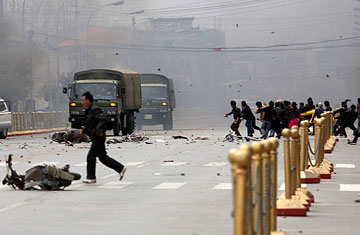
Protesters throw stones on military trucks in Lhasa, Tibet, on March 14, 2008
A new report from a group of Chinese scholars has for the first time challenged China's official explanation that the deadly riots that broke out across Tibet in March, 2008, were inspired by "overseas forces" — namely the Dalai Lama and the Tibetan government-in-exile. (Read "One Year After Protests, an Enforced Silence on Tibet.")
The report, which was recently published on a Chinese website, blames the riots not on outsiders but on Beijing's policy toward Tibet, claiming the central government has backed incompetent local officials, created an economy that provides few options for young people, and deprived Tibetans of access to equal justice under the law. (See pictures of last year's uprising in Tibet.)
While international human rights groups have said the rioting, in which at least 19 died, was a predictable response to the repression many Tibetans experience under Chinese rule, domestic criticism of the government on the politically charged subject of Tibet is rare in China.
What's perhaps most unusual about the report is that it was produced by a group of Chinese scholars working for a Beijing-based think tank. The 22-page document is based on research compiled over a month by four graduate students from Peking University, one of China's most prestigious schools. It was released by the Open Constitution Initiative, a six-year-old NGO run by Chinese lawyers. The group focuses on issues such as last year's tainted milk powder scandal and reform of China's household registration policy, which limits migration from the countryside to cities.
"We want to help society, and help build rule of law," says Xu Zhiyong, legal scholar and one of the group's founders. "We want to be objective. On questions like Tibet, human rights, and so forth, the Chinese government has a standpoint, foreign governments and foreign media have a standpoint. But it's also important to have an independent look at the problems."
While the central government says that 50 years of Communist Party rule of Tibet has led to broad economic gains, the report argues that few of the benefits are enjoyed by young people, who made up a large proportion of the rioters last year. The researchers found the while young Tibetans had given up interest in living as herders and farmers like their elders, a lack of opportunities for work or higher education meant that they have little hope of finding a place in the broader world to which they've been exposed. (Read "China Watches as Tibetan Talks Begin.")
In Tibet, many of the stores, restaurants and hotels are owned and run by ethnic Han Chinese, who are reluctant to hire locals. "In interviews with many young Tibetans, they all said finding work was difficult," the report says. "The main obstacle was language and a lack of fluency in Mandarin. In Lhasa, those who can speak Mandarin can't necessarily find jobs. Many employers won't necessarily hire Tibetans because they are seen as too lazy."
The report's harshest critique of Chinese rule was that in tearing down the traditional Tibetan élite, Beijing established a new hierarchy of local Tibetan officials who have badly managed the region's affairs. "The government has given local cadres great power, but shown little supervision. They have learned to use the goal of 'stable development' as a shield," the report says. It adds that many officials have learned to use the threat of "outside forces" promoting Tibetan independence to conceal their inability to address local problems.
By undercutting the official line that all grievances in Tibet are inspired by the Dalai Lama and driven by independence plotters, the group's report offers hope of a freer debate over tensions in China's sensitive border regions, according to Nicholas Bequelin, researcher for the NGO Human Rights Watch. "This is something that we've been waiting for a long time," he says. "Any improvement in Tibet and Xinjiang can only trickle down from more open areas of China." (Read "Dalai Lama to Stay Quiet on Tibet's Future.")
Xu says that Tibet shouldn't be considered a sensitive subject, and that the Open Constitution Initiative hasn't run into any problems with the government since releasing its study. But Bequelin says that the report hasn't caused trouble because it hasn't been widely distributed or covered within China. And while he notes that the group has been able to post the document on its website, he doubts printed copies will ever be permitted to circulate on the mainland.
See TIME's photos: "The Dalai Lama: Six Decades of Spiritual Leadership.
